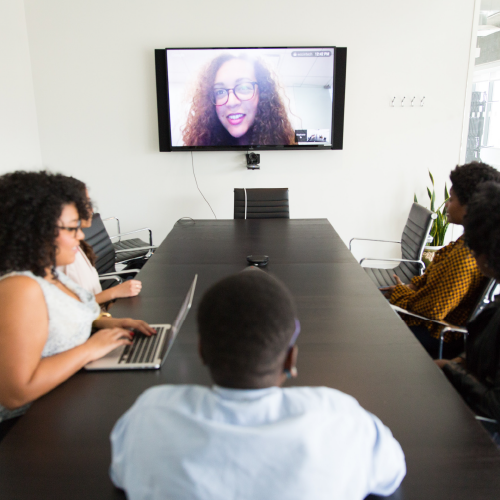Famed author and academic says leadership styles, business models, and society will reconfigure how we work.
“Leaders that did really well - did well by establishing trust,” says Heather McGowan, the strategist, and author. Her latest book, The Adaption Advantage provides an analysis of how the world of work and, therefore, leadership has changed during 2020 and what skills CXOs will need to develop for the forthcoming decade as organizations deal with a new wave of digital transformation that puts people at the heart.
McGowan heads up the Think Tank, Work to Learn, which specializes in the future of work, and is an advisor to blue-chip businesses such as banks - Citi and The World Bank - and Accor Hotels, and Biogen. McGowan has an impressive academic career studying innovation, which included senior roles at Rhode Island School of Design, Becker College, and Jefferson University.

“How are we going to go forward? Not how are we going to go back,” McGowan told the Nutanix CXO Leadership Exchange. McGowan advises that the pandemic is an opportunity to rethink the world of work and, therefore, leadership, and for CXOs not to be caught in the trap many politicians are making of trying to drag society and organizations back to 2019 methods.
“What enabled us all to work from home are the tools that we already had,” McGowan said of how the technology was already in place to cope with the Covid-19 disruption. “As humans, we adapted really quickly and as soon as we could. The change took place within two weeks on average.” The academic believes the pandemic heightened awareness of a major change that was taking place before the virus spread across the world. Society and organizations were becoming less focused on shareholder value and more human centric. The wellbeing and importance of talent have risen the agenda of business leaders, McGowan says. This is not to say there has been a decline in the value of a career; she agrees with findings from McKinsey, the business advisory group, which found that 75% of respondents get a sense of purpose from their work. “The veil between work and home has dropped, so happiness is not something for just post-work,” she says of how the pandemic has demonstrated to leaders that wellbeing is a part of business leadership, and the service or products a business offers.
“A survey by Microsoft of 30,000 respondents found that 40% of people will change jobs if they cannot have flexibility,” she says, adding that the traditional eight-hour day was devised by Henry Ford when he created the mass production of automobiles, over 100 years ago. This model, until now, has not been challenged.
“If you are designing a kitchen gadget for someone with arthritis, that gadget will be better for everyone,” she says of how designing organizations and processes to better serve those with the most pressing needs will ultimately benefit all members of the business and community. She adds that mothers should be at the forefront of designing ways of working for the years ahead. This is particularly important if organizations want to deliver improvements in diversity and inclusion and therefore reflect on the society they serve. Henry Ford’s business model of an eight-hour day was fine 100 years ago and the paternalistic society of then. But if ways of working only benefit one group in society, then diversity will not be established in an organization, and it will struggle to meet the demands of its wider customer base.


“The constraints of caring for a family means that we can design a process better for everyone,” McGowan says. CIO of the enterprise cloud computing technology firm Nutanix Wendy Pfeiffer agrees: “We worried, and we measured, and we found that the Nutanix workforce was more productive by double digits,” she says of 2020. “We see that people are more productive, and we see people are more sensitive to different factors than they used to be in the office, so it is better in many ways.”
“We had no choice, and we trusted our people, and we need to reward them by continuing to trust them,” McGowan says of the new leadership methods that took root last year and will need to remain in place. The pandemic has far from passed, and like digital disruption, uncertainty is the new normal, which means leaders must have continued faith in their teams. That means the new ways of working will be based on trust and creating frameworks for working together and working alone. McGowan says leaders must be asking why teams need to get together, where, and when, and to know what types of tasks are better suited to working together. “You must also consider how do you bring people in? We need to connect people to internally driven motivators,” she says of leadership.
This will benefit the retention of talent and allow team members to develop new skills. In McGowan’s advisory and writing work, she talks a great deal about the importance of re-skilling as part of the fourth industrial revolution, which is currently reshaping several vertical markets. “Innovation is learning. So, we must create teams that learn. Humans last longer than careers, which means that you cannot be an expert, so leadership is about coaching,” she says of helping teams experiment and then exploit the benefits of their learning.
Human-Centered
McGowan says that re-skilling is core to organizations becoming human-centric but adds that the events of 2020 and the continuing pandemic will drive further changes to how we work. “People are moving away from the more costly hubs. We have had global companies for a long time, and I hope that spreading people out of the cities will break down the split between the city and rural communities that is driving the split in our nation,” she says of her home in the USA. But this is a trend that is seen across the world; the Gillet Jaune movement in France through to the Brexit vote in England was because of perceived divides between the rural and urban workers.
The pandemic not only highlighted the threat to physical health that a virus can inflict, but it also caused an increased awareness of the fragility of mental health. “If you are not worried about the mental health of your people, you are not worried about the success of your organization,” McGowan says. Pfeiffer of Nutanix agrees: “The data shows that as leaders, we have a mandate to support mental health. As a technology leader, I think about technology interactions, for example, and now we have a responsibility to create environments that lessen anxiety.” McGowan responds that business leaders will find “it is in our best interests to do so.”
Additional Content

ARTICLE
Considering VDI? A Hyperconverged Infrastructure is Your Best Bet for Big ROI

Cloud Counsel
Leveraging the Business Benefits of Hybrid Cloud with Dutt Kalluri, Broadridge







